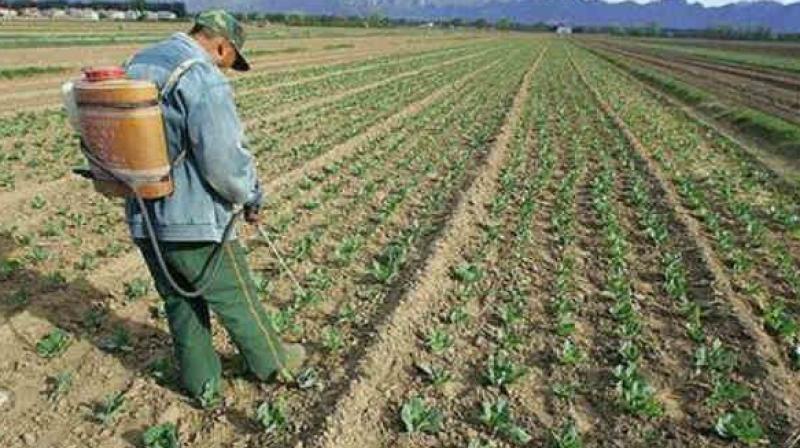Andhra Pradesh and Telangana suffer from high pesticide residues
Residue exceeding permissible levels found in 100 out of 1,920 samples.

Visakhapatnam: Andhra Pradesh and Telangana account for a hefty 24 per cent share of pesticide consumption in the country. The two states are grappling with increased pesticide residue in food commodities, while pesticides can help repel insects, pests and other diseases, their excessive/irrational use can lead to health hazards, ecological disturbance and disruption, increased pesticide resistance, etc. The adverse health effects include cancers and difficult reproductive, immune or nervous system conditions.
The Ministry of Agriculture found pesticide residue in 800 food samples and residue exceeding permissible levels in 100 samples out of a total 1,920 samples in the two states in 2015 (46 per cent food samples with pesticide residues) — way higher than any other state in the country.
There are about 13,600 pesticide dealers in the two Telugu states. Even though there are regulatory bodies to monitor and regulate production and safety of pesticides, there has been no mechanism to monitor the usage at the ground level.
Andhra Pradesh and Telangana have a cropped area of about 90 lakh hectares.
Joint-Director of Agric-ulture V. Satyanarayana said that with the majority of the area under cultivation being rain-fed, the farmers have been resorting to increased pesticide usage without knowing the ill-effects.
“Farmers can get more yield by using bio-pesticides and growing own seeds. The organic crops could even withstand the cyclones as the root system grows strong. We have recently formed about 330 farmer clusters in the st-ate to make them try their hands at organic farming and trained them under Dr Subhash Palekar. Integrating the WebLand details for the issuance of pesticides can help better manage the pesticide usage at the retail level,” Mr. Satyanarayana added.
R. Rekha, an Andhra University faculty in Food, Nutrition and Dietetics, said consumption of food with pesticide residues and exposure to the pesticides will cause various health conditions, including nervous system disorders, endocrine abnormalities, cancers, cognitive impairment, etc.
“Soaking the vegetables and fruits in salt water and washing them under tap water thereafter can help remove pesticide residue to a good extent. According to our studies, cauliflower, cabbage, radish and other cruciferous vegetables contain more residues,” Ms Rekha added.
Noted environmentalist J.V. Ratnam commented that pesticides have been wreaking havoc on the environment. “Only about 1 to 2 per cent pesticides reach the targeted species and the remaining runoff ends up in water bodies, human habitats and other environments, potentially contributing to air and water pollution, soil contamination and ecological disruption. For example, there has been a decline in the honeybee population due to increased pesticide usage. Bees play a crucial role in pollinating crops,” Mr Ratnam said.
Panel recommends ban on 13 pesticides
The expert committee, constituted under former professor at the Indian Agricultural Research Institute, Anupam Verma recommended a ban on 13 pesticides that were banned, restricted or withdrawn in one or more countries but continued to be registered in India.
The committee also recommended reviewing 27 pesticides in 2018 after completion of certain technical studies and phasing out six pesticides by 2020. For example, exposure to ‘Chlorpyrifos,’ which would be again reviewed in 2018 by the Union Government, has been linked to neurological, developmental and autoimmune disorders. The committee was appointed by the Centre to carry out a technical review of 66 pesticides.
The committee has suggested continued use of 18 pesticides. Carbofuran, a carbamate pesticide set for review in 2018, is highly toxic to vertebrates and an endocrine disruptor in humans, including disrupting the reproductive system. Carbofuran was banned in Canada and the European Union countries.
The list of pesticides that would be phased out by 2020 include Alachlor, Dichlorvos, Phorate, Phos-phamidon, Triazophos and Trichlorfon.
The banned 13 pesticides include Benomyl, Carba-ryl, DDT, Diazinon, Fenar-imol, Fenthion, Linuron, MEMC, Methyl Parathion, Sodium Cyanide, Thio-meton, Tridemorph and Trifluralin.

